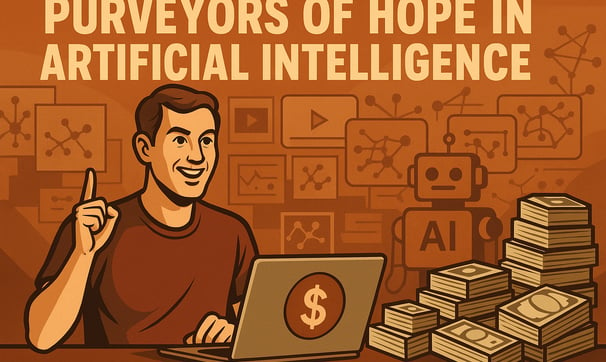Merchants of Hope in the Age of Artificial Intelligence
AI WORLDFEATURED


Artificial Intelligence or Illusion? Hope Merchants Are Turning Dreams of Easy Wealth into Clickbait Nightmares.
The development of artificial intelligence has led to a rapid increase in the number of hope merchants. Especially on social media platforms, self-proclaimed experts of all ages have begun to pump up dreams of getting rich quickly, gathering followers along the way. These contents, decorated with slogans like 'Make a video, get rich!', are nothing more than hundreds of repetitive videos produced with a copy-paste mentality. Real information, however, gets lost amidst this pollution.
In this period of deepening economic crisis, low- and middle-income citizens are chasing after these hope merchants with the expectation of generating passive income. As of 2025, the number of similar contents produced by hope merchants on YouTube increased by 150%. On Instagram, the view counts of such contents grew by over 200%. Each video is no different from the previous one, only adorned with different titles and visuals.
Especially with the increased capacity of artificial intelligence to produce text and create videos, this copy-and-paste logic has become almost automated. In 2024, the average hope merchant was producing 50 videos per week, but by 2025, this number rose to 80 videos per week. 85% of these contents consist of re-uploading previously published videos with minor changes. The same contents are relaunched with a few small adjustments. Real information, however, gets buried in the waste of fake experts.
This situation not only creates information pollution but also steals people's time and energy. According to 2025 data, 60% of those who watched hope merchants' videos stated that they could not achieve the promised results. Truly valuable information and learning opportunities are crushed under this artificial glitter. Meanwhile, hope merchants continue to deceive masses by selling dreams.
The Manipulation Behind the Curtain
The promise of quick riches is a powerful hook, especially in times of economic uncertainty. Hope merchants exploit this vulnerability by using carefully crafted marketing techniques. Keywords like "financial freedom," "passive income," and "easy money" are strategically placed to capture attention and feed into people's desperation. In reality, the so-called 'secrets' shared in these videos are often publicly available information dressed up in sensational packaging.
Platforms like YouTube and Instagram are designed to reward engagement, not authenticity. The algorithms push forward content that gets clicks, shares, and comments, regardless of its validity. This creates a loop where fake experts are incentivized to produce more content, drowning out credible sources. In fact, a study conducted in late 2024 revealed that 70% of viral "get rich quick" videos contained misleading or outright false information.
The Role of Artificial Intelligence in Scaling Misinformation
Artificial intelligence plays a crucial role in amplifying this cycle. With AI-driven tools, these content creators can now mass-produce videos and articles with little effort. In just a few hours, one can generate hundreds of variations of the same promise, rephrased slightly to seem original. Tools like ChatGPT, Midjourney, and AI-powered video creators allow for rapid content generation, making it nearly impossible for viewers to discern fact from fabrication.
The danger here is not just individual disillusionment but collective misinformation. As fake narratives spread, public perception becomes skewed, making it even harder for real opportunities and truthful information to surface. Experts warn that if this trend continues, we may face a "truth decay," where authentic information is no longer distinguishable from fabricated content.
Towards a Solution: Regulation and Awareness
The growing influence of hope merchants highlights the urgent need for stricter regulations and greater awareness. Social media platforms must take responsibility for curating authentic content and cracking down on misinformation. Likewise, media literacy should be prioritized to help individuals discern credible information from fabricated schemes.
Artificial intelligence has the power to democratize information, but without oversight, it risks empowering those who seek to profit from false promises. As we move forward, the challenge will be to harness AI's capabilities responsibly, ensuring that real knowledge is not drowned out by noise.
